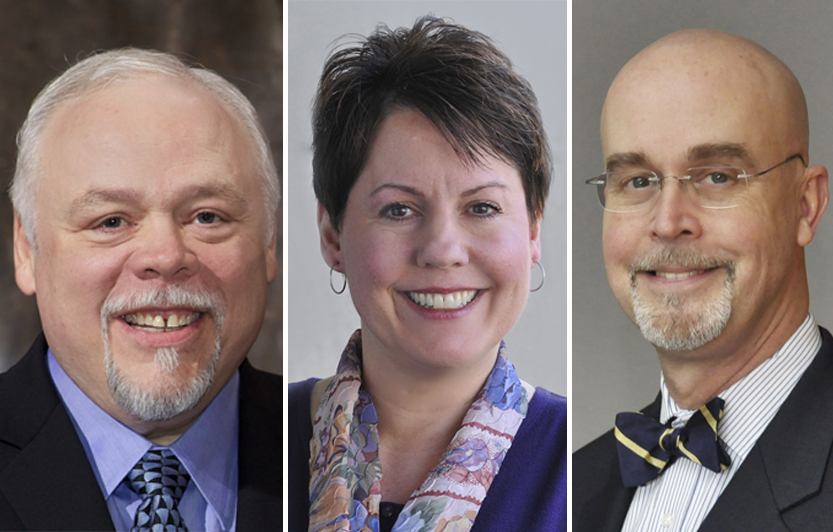With last fall’s election fresh in their memories, many legislators are proposing changes to the election process. In-person voting, prepaid postage on ballots, and relaxing constituent outreach restrictions for incumbents could all become a reality if the measures pass.
Sen. Don Benton, R-Vancouver, wants to loosen the rules about what information he and other state lawmakers could put on their official websites and in their official newsletters during campaign season. Benton said during a public hearing on his proposal, Senate Bill 5019, that although some restrictions are necessary to prevent campaign abuses, other restrictions are “completely ridiculous” and prevent his ability to communicate with the people in his district.
State law prohibits legislators running for election to make any changes to their official Web pages during the months leading up to an election. (Most candidates maintain a campaign website, the content of which they can control.)
Incumbents also are limited in the amount of official mail they can send to constituents. Legislators are allowed to send two newsletters about the legislative session during a campaign year, and there are rules for what can be put in those newsletters. The second newsletter can’t be sent out any later than 60 days after the legislative session ends.
The bill Benton is proposing would lift those campaign regulations. It also states that “legislators have complete discretionary control of the content, text, language, and format of newsletters, subject only to budget limitations.”
“Frankly,” Benton said, “I’ve been here 18 going on 19 years, and I get increasingly offended by staff, who may only have been on the job six months or less, telling me what I can or cannot say in a newsletter to my constituents, who have elected me to represent them, and I am trying to communicate with them.”
During the hearing, some lawmakers on the Senate Governmental Operations Committee said they were concerned that the bill was too broad in what it would allow legislators to include in their state-funded newsletters in a campaign year. Benton said he’ll try to narrow the bill so the newsletters would relate only to a lawmaker’s legislative duties.
Rep. Jim Moeller, D-Vancouver, introduced House Bill 1720, which would make the voters more aware of the state’s Public Disclosure Commission, the state agency that tracks money in politics. Under his bill, ballots and voter pamphlets would include the statement: “For a list of the people and organizations that donated to state and local candidates and ballot measure campaigns, visit www.pdc.wa.gov.”
A companion bill to Moeller’s proposal has been co-signed by Benton and Sen. Ann Rivers, R-La Center.
Rep. Ed Orcutt, R-Kalama, introduced a proposal that would give state lawmakers 30 fewer days each year to accept campaign donations. State law prohibits legislators from asking for campaign contributions during a legislative session.
Orcutt’s House Bill 1385 would extend that prohibition for 30 days following the end of a legislative session.
Orcutt represents the 20th Legislative District, which dips into parts of north Clark County. His election reform bill was introduced Jan. 24 and has yet to receive a committee hearing.
Additional election bills under consideration in the Legislature:
• House Bill 1211 would require the secretary of state’s office to print and distribute a primary election pamphlet in even-numbered years. Last year, Clark County printed a primary voters pamphlet for races specific to the county, but statewide races were missing from the pamphlet because the state couldn’t afford to cover those costs.
During the election season last year, “that’s probably the biggest complaint we received,” Clark County Auditor Greg Kimsey, a Republican, said Tuesday. “We’re a huge supporter of (the primary pamphlet) and really, really hope the Legislature will fund that.”
• House Bill 1267 would allow citizens to register to vote on the day of an election. Currently, the latest people can register to vote is eight days before an election, if they register in person, according to state law.
Kimsey said county auditors from around the state are opposed to this bill because it could create voter barriers on Election Day. Kimsey estimated that, based on what’s happened in other states, Clark County election officials could be faced with 6,000 people wanting to register to vote on the day of an election.
The county would have to establish five other election offices to meet that demand, he said.
• Senate Bill 5498, introduced by Benton, would allow citizens to request that their county provide polling places to vote. Several years ago, the state eliminated its traditional voting booths and moved to a vote-by-mail system.
The bill has yet to receive a hearing, and Kimsey said he opposes the bill.
“We should not have multiple voting systems,” Kimsey said. “Voters and the voting process benefits from having a single voting system from across the state.”
• Senate Bill 5027 would require counties to provide return postage on the primary and general election ballots they send to voters. The counties would be reimbursed for the postage costs by the state, and that would cost the state an estimated $6.5 million during the 2013-2015 budget cycle.
“Prepaid postage on return ballot envelopes is one way to lower those barriers to (voter) participation,” the bill’s sponsor, Sen. Bob Hasagawa, D-Seattle, said of his proposal. “Students often pay bills online now, so who has a spare stamp kicking around?”
Kimsey said he worried a prepaid envelope wouldn’t receive a postmark from the post office, meaning it would be impossible to tell which ballots had been postmarked by Election Day. Ballots postmarked after Election Day are invalid.
• Senate Joint Memorial 8002 would ask Congress to amend the U.S. Constitution in a way that would require more federal disclosures for political donations. The proposal is in response to the U.S. Supreme Court’s Citizens United decision, which created a way for corporations, unions and wealthy individuals to make unlimited, anonymous campaign contributions.
The proposed constitutional amendment would “keep our country from being changed radically by those who have billions of dollars to do so,” its sponsor, Sen. Adam Kline, D-Seattle, said during a committee hearing this week. “It’s one thing to know that our country is being bought. … It’s another thing not to know who’s buying it. And that, unfortunately, is the situation here.”
• Senate Bill 5270 would allow teens, ages 16 and 17, to pre-register to vote when they get their driver’s licenses. The state’s Motor Voter program is the most popular way to register to vote, said the bill’s primary sponsor, Sen. Andy Billig, D-Spokane. But young people miss out on that convenience because they get their licenses before they can vote and usually don’t go back to the department of licensing until they are 21.
• House Bill 1103 would require that by 2020, ballots in all of the state’s 39 counties include the same ballot-marking technique. In Clark County, ballots ask voters to fill in boxes, while other ballots ask voters to fill in ovals, or to fill in a line next to their favorite candidate.
Stevie Mathieu: 360-735-4523; http://facebook.com/reportermathieu; http://twitter.com/col_politics; stevie.mathieu@columbian.com.




